- What is a Defi wallet?
- What are the essential factors to consider before creating a DeFi wallet?
- What are the best examples of a Defi wallet?
- How to choose a DeFi wallet
- What are the steps involved in building a DeFi wallet?
- What is the required tech stack to create a Defi wallet?
- What is the best way to create your Defi wallet?
- Are you looking to make your Defi Wallet platform? We can help
- FAQ
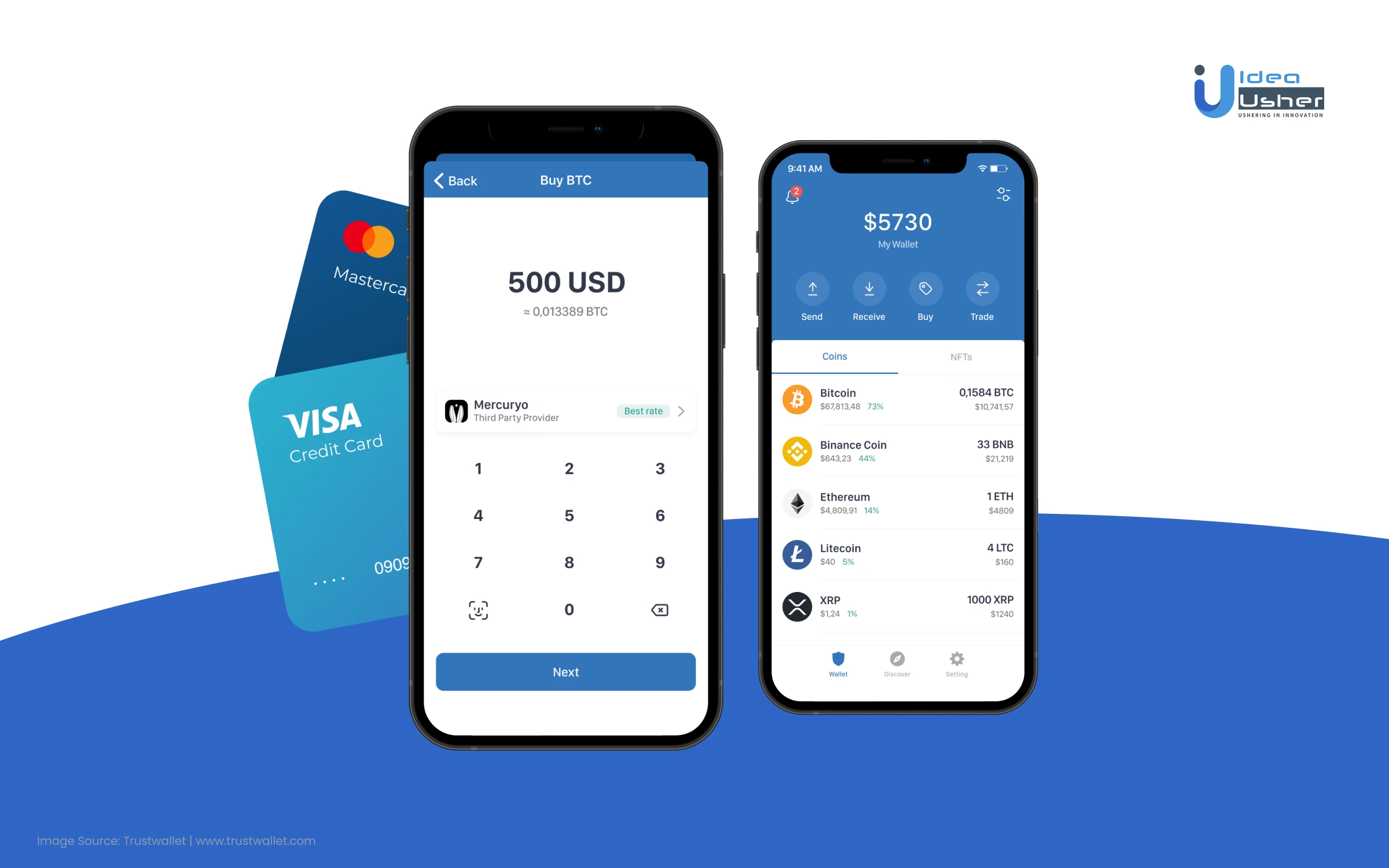
Decentralized finance wallets have gained popularity among the cryptocurrency community to securely store and access digital assets.
A Defi wallet is a non-custodial wallet that stores digital assets like cryptocurrencies and NFTs. The wallets allow their users to have full control over their digital assets by giving them access to their private keys. Also, Defi wallets enable connectivity to many web 3 and Defi applications.
According to bccresearch.com, the global DeFi market was valued at $9.4 billion in 2021 and is expected to reach $70.3 billion by 2027, at an CAGR of 39.5% during the forecast period.
There is a great business opportunity for entrepreneurs looking to create and offer decentralized finance services to their users. In detail, let’s understand the features and required steps to create a decentralized finance wallet.
- What is a Defi wallet?
- What are the essential factors to consider before creating a DeFi wallet?
- What are the best examples of a Defi wallet?
- How to choose a DeFi wallet
- What are the steps involved in building a DeFi wallet?
- What is the required tech stack to create a Defi wallet?
- What is the best way to create your Defi wallet?
- Are you looking to make your Defi Wallet platform? We can help
- FAQ
What is a Defi wallet?
A decentralized finance wallet is a digital wallet that utilizes blockchain technology. These wallets enable users to store, manage, and trade digital assets such as cryptocurrencies and NFTs.
The wallet uses smart contracts and other blockchain-based protocols to enable a secure and transparent environment for users to manage their digital assets.
Any central authority does not control these wallets as they rely on blockchain technology, resulting in a great level of decentralization.
It allows access to different DeFi-based services such as lending, borrowing, trading, and investing in various blockchain-based digital assets.
What are the essential factors to consider before creating a DeFi wallet?
From extensive security to easier accessibility, a crypto wallet should inhibit the following properties:
1. Security
Ensure the patching of any security vulnerabilities and the latest security measures are implemented. Additionally, incorporating smart contract auditing and penetration testing enables you to identify and address any vulnerabilities in the smart contract code, further strengthening the wallet’s security.
It’s also important to have a transparent and clear policy on handling security breaches and a dedicated security team responsible for monitoring and addressing any potential threats.
By implementing robust security measures and regularly updating and testing the wallet’s security, you can help ensure that users’ assets are protected and that they can trust their funds are safe when using your decentralized wallet.
2. Easier accessibility
It is important to provide comprehensive documentation and tutorials and offer customer support and troubleshooting assistance to ensure that users can resolve any issues they may encounter.
By focusing on ease of use and accessibility, you can create a user-friendly, secure, and reliable wallet, providing a great experience for your users.
3. Integration with exchanges
It is important for a blockchain wallet to have the capability to integrate with decentralized exchanges (DEXs). This will allow for seamless trading of assets for users, as they will not have to transfer assets between wallets back and forth.
Integration with DEXs can greatly enhance the user experience and give them more flexibility in managing their assets.
Therefore, it is essential for a blockchain wallet to have this feature to stay competitive in the market and offer a professional-grade service to users.
4. Support to multiple assests
Ensure that all the supported cryptocurrencies are fully integrated with the wallet and that users can easily and securely manage and store their assets.
By offering support for a wide range of popular cryptocurrencies and staying up to date with the latest crypto development, you can create a blockchain wallet that is user-friendly, versatile, and adapting to changing market conditions, providing a great experience to your users.
Now, let’s check the best examples of a decentralised finance wallet.
What are the best examples of a Defi wallet?
The top 4 decentralized finance wallets are as follows:
1. Defi Swap
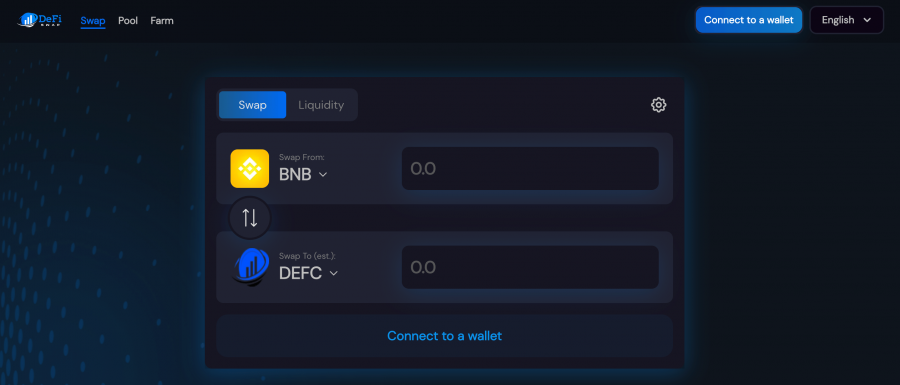
The Defi Swap wallet is a decentralized platform that enables users to passively earn interest on their tokens through a process known as “token sweeping.” This feature allows users to deposit their tokens into the platform and earn a yield without needing a centralized intermediary.
Additionally, users are not required to complete any form of KYC check to access the platform.
The Defi Swap wallet offers a wide range of supported coins, including over 50 different cryptocurrencies and native Defi coin tokens. The platform offers several yield farming mechanisms divided into four distinct tiers.
Each tier has its own lock-up period, with yields ranging from 50% to 75% per year. This allows users to choose the level of risk and return that best suits their investment strategy.
| Founded in | 2020 |
| Available on | Web |
| Key features | Automatic liquidity poolsUser-friendly staking mechanism |
| Pricing structure | N/A |
2. BitKeep
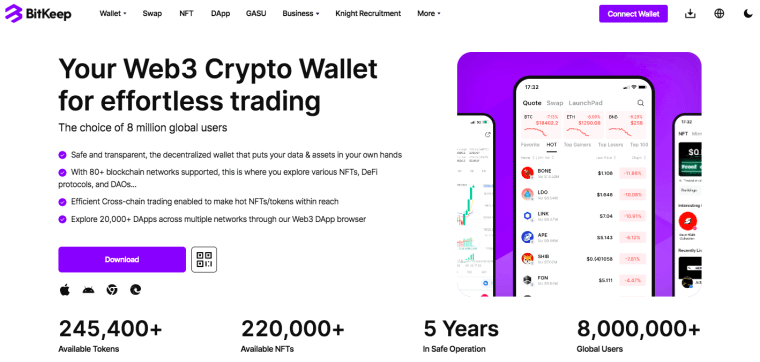
Bitkeep is a web 3 cryptocurrency wallet that boasts a user base of over 8 million individuals worldwide. The platform strongly emphasizes user control, allowing wallet holders full autonomy over their digital assets.
Bitkeep offers a wide range of token support, with access to over 245,400 different tokens.
Additionally, the platform allows users to access their preferred NFTs on multiple mainnets, including Ethereum, Binance Smart Chain (BNB), Polygon, Huobi Eco Chain (Heco), and KLAY.
The platform also includes a built-in Web3 DApp browser, which allows users to connect with over 20,000 decentralized applications.
Furthermore, Bitkeep offers an instant gas feature, enabling users to swap their tokens without incurring gas fees on the native token. This feature allows for more efficient and cost-effective token trading.
| Founded in | 2022 |
| Available on | Web, android & ios |
| Key features | Double encryption storage mechanism |
| Pricing structure | N/A |
3. Trust Wallet
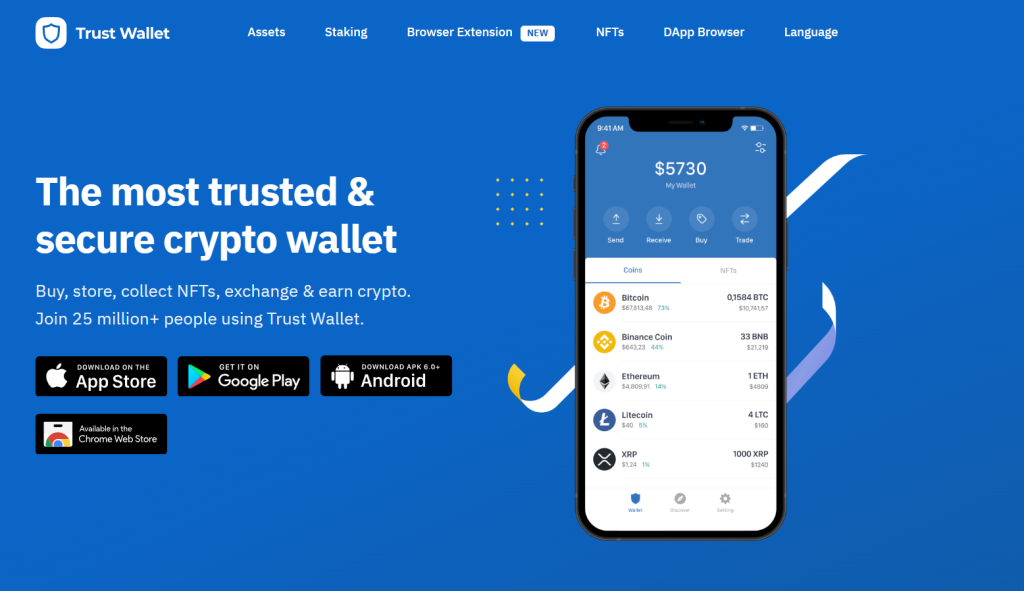
A mobile-based wallet that is used by over 25 million people worldwide and supports over 7,000,000 crypto assets. The platform supports over 69 blockchain platforms, making it one of the best wallets for asset selection.
One of the most remarkable features of this platform is the “Trust dAapp browser”, a fully functioning Web 3.0 browser through which users can utilize a wide array of decentralized applications.
Trust wallet has a dedicated staking mechanism that supports 12 popular tokens, where some selected tokens offer a yield of more than 10% per year. The platform also has the support of NFTs where users can purchase and store their nonfungible tokens over the long term.
| Founded in | 2017 |
| Available on | Web, android & ios |
| Key features | Trust dAapp browse |
| Pricing structure | 1% fee on in-app crypto purchases |
4. Crypto.com Defi Wallet
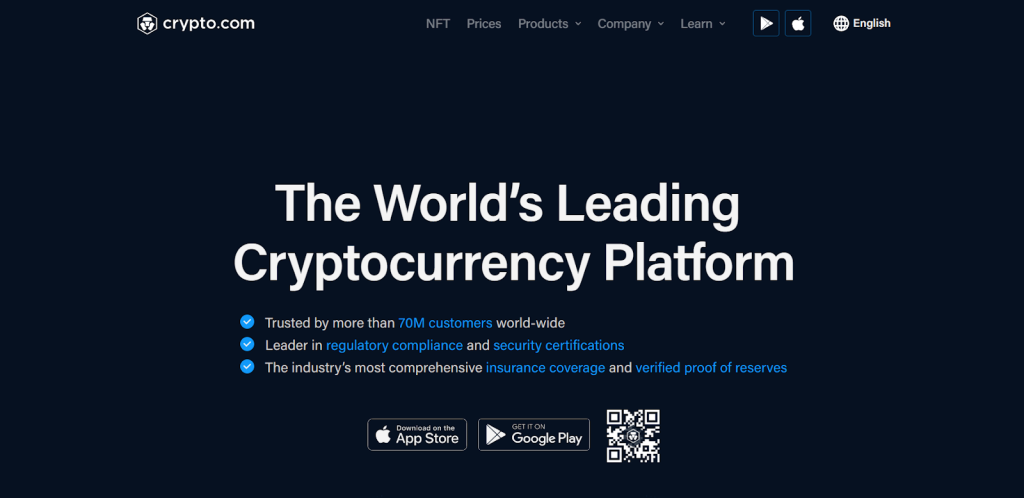
As the name implies, this wallet is provided by crypto.com, which is one of the best crypto exchanges regarding fees and asset selections. The platform also includes a “Defi Earn” feature through which users can generate a yield on over 35 supports the tokens.
The wallet offered by this platform is noncustodial and available to download for free from App Store and Google Play.
The non-custodial nature of their wallet allows its users to have complete control over their holdings in private keys. Their wallet supports over 100 crypto assets, including Defi tokens and altcoins.
| Founded in | 2016 |
| Available on | Web, Android & ios |
| Key features | Defi Earn |
| Pricing structure | Up to 0.40% for trades |
How to choose a DeFi wallet
Choosing a DeFi wallet can be a daunting task, but here are some steps you can follow to make an informed decision:
1. Determine which blockchain(s) you plan to use
Each DeFi wallet is built to support certain blockchains. So, the first step is to identify which blockchain(s) you plan to use for your DeFi activities. For example, if you plan to use the Solana blockchain, you’ll need to use a wallet that natively supports it, such as Solflare, Sollet, or Phantom.
2. Consider the features you need
Different DeFi wallets come with different features. Some wallets are better at supporting certain assets, while others offer integrated DeFi applications.
Think about the features you’ll need for your specific use case. For example, if you plan to hold a lot of NFTs, you might want to choose a wallet like Rainbow Wallet that allows you to view your NFTs within your account.
3. Check the security measures
Security is a critical aspect of DeFi wallets. Look for wallets that use strong encryption methods, offer two-factor authentication, and allow you to control your private keys. Make sure to keep your seed phrase safe and secure.
4. Evaluate user-friendliness
DeFi can be complicated, so it’s important to choose a wallet that is easy to use. Look for a wallet that has a simple and intuitive interface and offers clear instructions for performing various tasks.
5. Research community feedback
Finally, it’s a good idea to research community feedback on different DeFi wallets. Look for reviews and feedback from other users to get an idea of their experiences with the wallet. This can give you a better sense of the wallet’s strengths and weaknesses.
By following these steps, you can choose a DeFi wallet that meets your specific needs and provides a secure and user-friendly experience. Remember to always exercise caution when interacting with DeFi protocols and keep your seed phrase safe at all times.
Check the process of creating a crypto wallet.
What are the steps involved in building a DeFi wallet?
Creating a blockchain wallet requires specialized knowledge and expertise in the field of decentralized technology. To ensure that your project is executed correctly and efficiently, it is recommended to hire professional developers.
These developers will analyze your project requirements and provide you with the most appropriate solution to meet your needs.
One way to ensure that you have the right team is to outsource your project to a reputable blockchain development company.
These companies have a team of experienced developers who are well-versed in the latest blockchain technologies and can provide you with the best possible solutions.
The team will follow the given steps:
Step 1- Defining the problem and setting goals.
Based on the project requirements, the team of blockchain developers will first analyze the problem your potential customers are facing and how your blockchain wallet can solve those problems. This analysis will help the team to identify the specific features that should be included in your wallet to provide the best possible user experience.
Once the required features have been identified, the team will evaluate the available blockchain networks to determine the best fit for your project. This evaluation process will consider scalability, security, and ease of use.
Some of the most popular blockchain networks commonly used for blockchain wallets include Ethereum, EOS, and TRON. Each of these networks has its own advantages and disadvantages, so it is important to carefully evaluate each to determine the best fit for your project.
Step 2- Designing the architecture
Selecting the appropriate blockchain architecture for your project is crucial in development. The team of blockchain developers will carefully evaluate your business type and use case to determine the most suitable architecture for your project.
Several options are available, including public, private, permissionless, and hybrid blockchains. Public blockchains are decentralized and open to anyone, while private blockchains are restricted to specific users and organizations. Permissionless blockchains allow anyone to participate, while hybrid blockchains combine the features of public and private blockchains.
The nature of each blockchain network offers its own exclusive benefits. However, based on your business requirements, choosing a private blockchain may be the best solution to build a decentralized finance (Defi) wallet. A private blockchain can provide your project security and privacy while allowing decentralized transactions.
Additionally, we recommend you go for the cloud framework when deciding between cloud or hybrid. Cloud frameworks are more scalable and offer better security features than traditional hybrid frameworks. This means that your wallet will be able to handle a higher number of transactions and will be more secure.
Step 3- Choosing the consensus algorithm
The selection of the appropriate consensus algorithm is crucial to the functioning of your blockchain wallet. The consensus algorithm is responsible for authenticating transactions and ensuring they are valid.
Several options are available, including proof of work, proof of stake, Byzantine fault tolerance, and others. Each algorithm has its own unique characteristics and advantages, and the choice of which one to use will depend on the specific requirements of your project.
Proof of work, for example, is a well-established algorithm that is used by many popular blockchain networks, such as Bitcoin and Ethereum. It is a highly secure algorithm, but it can be resource-intensive and may not be the best choice for projects that require high scalability.
On the other hand, proof of stake is a newer algorithm that is becoming increasingly popular. It is less resource-intensive than proof of work and is more energy-efficient, making it a good choice for projects that require high scalability.
Byzantine fault tolerance is another popular algorithm used to authenticate transactions in a decentralized network. It is known for its high security and fault tolerance, making it a good choice for projects that require high security.
Outsourcing your project to the best blockchain developer will help you select the appropriate consensus algorithm for your crypto wallet. The developer will analyze your project requirements and provide you with the best solution that meets your needs.
The developer’s expertise and experience in the field of blockchain technology will ensure that your project is executed correctly and efficiently.
Step 4- Selecting the blockchain platform
The selection of the appropriate blockchain network is crucial to the success of your blockchain wallet project. When making this decision, the blockchain developer will consider several factors, such as your project’s needs, budget, and scalability.
Currently, Ethereum is the leading platform for making decentralized finance wallets. It is a highly popular and well-established blockchain network for Defi projects. Ethereum offers a wide range of features and tools that make it well-suited for building decentralized finance applications.
One of the key advantages of Ethereum is its high scalability, which allows it to handle many transactions.
Additionally, it has a large and active community of developers constantly working to improve the platform.
Ethereum also supports smart contracts, which are self-executing contracts that includes agreement written directly into code. These smart contracts can automate functions within your wallet, such as token issuance and trading.
Furthermore, Ethereum also has a wide range of token standards, such as ERC-20 and ERC-721, which can be used to create custom tokens that can be used within your wallet.
Step 5- Designing UI
It is essential to note that a wallet’s user interface (UI) plays a crucial role in ensuring an easy and seamless user experience.
Implementing a clear and intuitive navigation system within the UI is necessary which can be achieved by using simple and consistent design elements, such as a well-organized layout and clear labeling of buttons and menus.
Additionally, it is important to ensure that all available features are easily accessible and straightforward to use, to minimize user confusion and improve overall usability.
Overall, a well-designed UI is essential for providing a positive user experience and promoting the adoption of a blockchain wallet.
Step 6- Testing and deploying the wallet
When developing a mobile wallet app, it is essential to choose the MVP (Minimum Viable Product) model early. The MVP model should include all the necessary features to make the wallet functional. This approach allows for testing and validation of the wallet’s core functionality before investing in additional features and technologies.
As the development of the wallet progresses, it may be beneficial to integrate other technologies, such as AI, Big data, and IoT to enhance the functionality of the wallet. These technologies can improve the user experience and provide additional features such as personalized recommendations and enhanced security.
However, it’s important to note that these technologies’ integration should be done strategically and phased after the MVP has been validated and proven successful. The goal should be to add value to the app and improve the user experience while avoiding unnecessary complexity and added development costs.
What is the required tech stack to create a Defi wallet?
These are the required tech stack to create a blockchain wallet:
| Blockchain | Ethereum, Binance Smart Chain. |
| Smart contracts | Ethereum Virtual Machine, BSC Virtual Machine. |
| Languages | PHP, JAVA, MEAN Stack, Laravel |
| Databases | MySQL, MongoDB, Redis. |
| LAMP | Linux Server, Apache, Mysql DB, Php |
| Website development | Laravel / Codeigniter |
| MEAN | MongoDB, Express JS, Angular js, Node js |
| For Android | Java, Kotlin, Node JS, ROR, Laravel |
| For iOS | Swift, Node JS, ROR, Laravel, IOS fabric |
| Cloud | AWS, Google Cloud Platform, MS Azure |
| Push notifications | Twilio, Amazon SNS, MAP |
| Other | RSpec, Phantom JS, PUMA server, PhoneGap, C ++, Xcode |
What is the best way to create your Defi wallet?
When developing a blockchain-based mobile wallet app, hiring a blockchain developer is essential to ensure the project’s success and quality. One of the best ways to acquire such expertise is by outsourcing the project to a blockchain development company.
These companies specialize in developing blockchain-based applications and have a team of experienced developers who possess the necessary skills and knowledge to handle the project from start to finish. They can assist with market research, development, testing, and deployment of the wallet app.
By outsourcing the project to a blockchain development company, you can benefit from their expertise and experience, as they have a team of experts who are proficient in the latest blockchain technologies, development tools, and software development methodologies. This can help ensure that your wallet app is built to the highest standards and meets the requirements of your target market.
Furthermore, development companies usually have a wide range of experience in the field. They can handle the deployment of your app on your targeted market, ensuring compliance with all legal regulations and publishing your app to different stores.
Are you looking to make your Defi Wallet platform? We can help
Idea Usher’s custom blockchain development service provides an opportunity to get a business-ready Decentralized Finance (DeFi) wallet with all the necessary features. Our team of experts works closely with your project to implement the best solution for your crypto wallet, ensuring that it meets the specific requirements of your business.
Our service includes market research, development, testing, and deployment of the wallet app. We use the latest blockchain technologies, tools, and software development methodologies to ensure the wallet is built to the highest standards.
Our team of experts has extensive experience in developing DeFi 2.0 wallets and is proficient in implementing features such as smart contract integration, token management, and secure key storage. We also provide a user-friendly interface that allows users to interact with the wallet and access their funds.
Our custom blockchain development service can help ensure that your wallet is secure, scalable, and compliant with all legal regulations. Additionally, we can assist with deploying your app on different platforms to reach your target market.
Contact Idea Usher
Email:
Phone:
FAQ
1. What is a Defi wallet?
A decentralized wallet that allows users to store, manage and interact with various types of digital assets, such as cryptocurrencies and NFTs.
It is built on blockchain technology that offers a variety of functionalities for users to interact with different protocols and applications, such as for lending, borrowing, trading, and investing in various digital assets.
2. How does DeFi wallet work?
The wallet allows users to store and manage various types of digital assessed on a blockchain network such as Ethereum, Solana, etc.
These wallets typically use smart contracts to facilitate transactions and have built-in functionality to interact with different protocols, such as lending, borrowing, and trading on decentralized exchanges.
3. What are the top 5 DeFi wallets?
These are the top five examples of decentralized finance wallet:
- ZenGo
- MetaMask
- Trust Wallet
- Argent Wallet
- Crypto.com Wallet









Gaurav Patil